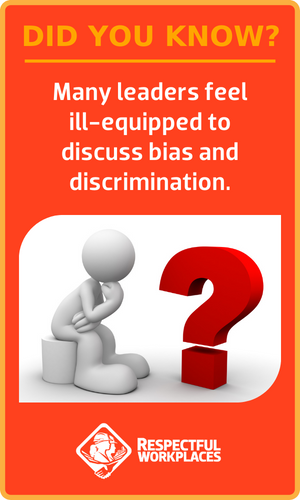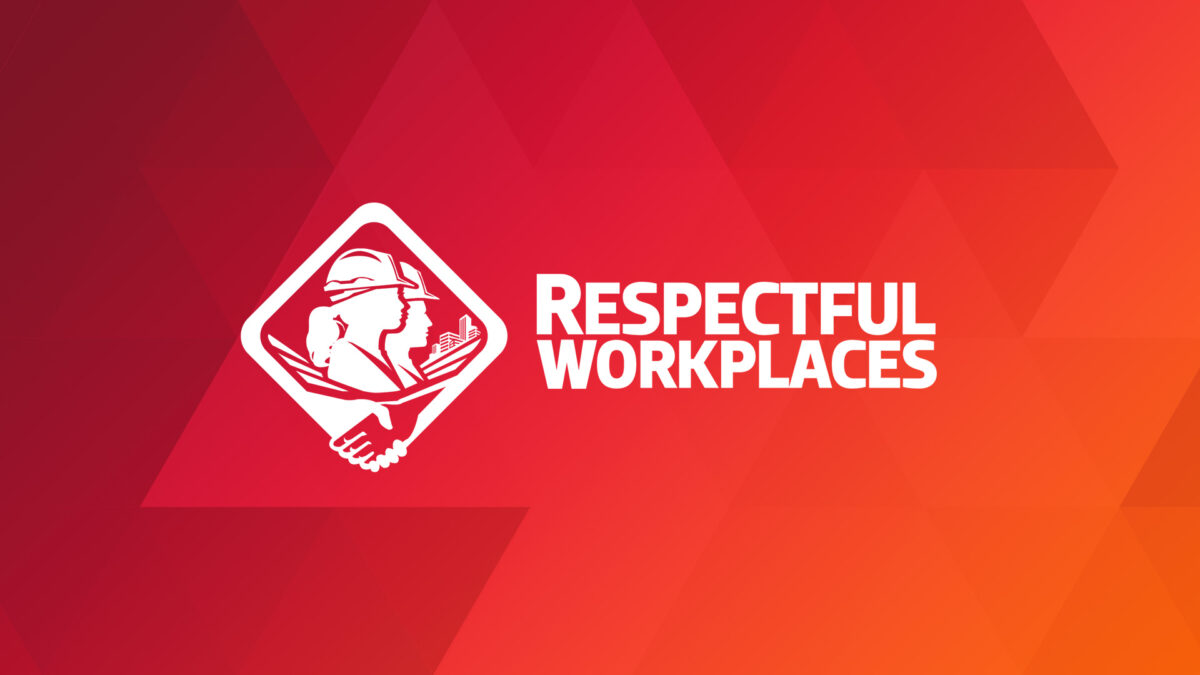Does your organization provide training to enable effective and important conversations on bias and discrimination?

Our readers will recall that workers are more engaged and feel a sense of belonging in organizations in which they can speak up with ideas, questions, or concerns. Speaking up describes the back-and-forth exchanges people have at work, from volunteering a concern in a meeting to giving feedback to a co-worker.
Leading organizations recognize that members of under-represented groups can bring powerful insights to policies and decisions. However, research shows that they often experience systemic barriers that prevent their full participation. In addition, they are often discouraged from speaking up about the barriers they experience for fear of backlash.
Leaders and managers can help to reduce these barriers by practicing leadership inclusiveness. Inclusive leaders are approachable and accessible; curious to learn more about an issue and proactively invite input. Research has found that these qualities help to create a speak-up culture that significantly increases the engagement levels of members of under-represented groups.
However, when managers seek to create a speak-up culture, they may be required to engage in difficult conversations about the barriers, bias, and discrimination that members of under-represented groups experience. Yet, many managers feel ill-equipped to engage in these conversations.
In her book, We Can’t Talk About That at Work, Mary-Francis Winters explains that many people experience fear at the thought of, or actually engaging in, conversations about issues such as gender, race, and ethnicity.
Some of those fears are:
- saying something insensitive and offending the very people they wish to engage
- that conversations about gender, race, and ethnicity will do more harm than good
- that things are “not so bad” in their organization and they candidly struggle to fully grasp the barriers that some of their team members experience
How can leaders and managers overcome these fears and obstacles?
A speak-up culture needs effective conversations
Inclusive managers enable effective conversations: they proactively invite input, listen, and avoid the tendency to jump to quick solutions.
Here are five strategies for enabling more effective conversations:
1. Assume positive intent. Embrace the mindset that talking will lead to something good. Put aside your own judgements, viewpoints, and biases to focus on what the person actually means.
2. Engage in dialogue, not debate. Listen in order to understand, not necessarily to reply. Remember that dialogue is open-ended: you express your experiences, viewpoints, and perspectives, and learn from someone else’s. Shared learning is the goal, not winning an argument.
3. Be open, transparent, and willing to admit mistakes. Practice, practice, practice. Honest communication is a skill to be developed. Accept the fact that you won’t always say the right thing.
4. Embrace the power of humble listening. Don’t just hear what someone is saying: listen. Put your own ego, assumptions, and viewpoints aside to reflect on and learn from someone else’s experiences.
5. Create safe spaces where a little bit of discomfort is OK. Acknowledge to yourself and your team members that sharing perspectives might involve taking a risk and that it might be uncomfortable.
A speak-up culture needs important conversations
Recognize that effective conversations are only the beginning of creating more opportunities for the full participation of members of under-represented groups. Managers, like everyone, may be subject to unconscious bias that can influence their behaviour toward diverse team members, resulting in fewer opportunities for them to speak up with ideas, questions, or concerns.
Members of under-represented groups report being excluded from meetings relevant to their job; being excluded or passed over for career growth opportunities, and not receiving one-on-one job performance reviews. (Please see blog #48 for a discussion about how unconscious bias can influence manager behaviour patterns.) However, speaking up about these barriers is also discouraged.
How can managers overcome these barriers? Inclusive managers enable important conversations: they check their own behaviour patterns and create opportunities for diverse team members to speak up.
Here are five strategies for enabling important conversations to overcome barriers:
1. Think about who you know the least on your team. Schedule time to connect with them about their experiences at work and how you can enhance your working relationships with these individuals.
2. Notice who is silent in meetings. Follow up one-on-one to find out why and ask how you can support them in making sure their ideas and input are heard.
3. Invite team members to anonymously write down two to three social norms or processes that prevent them from speaking up. Then hold a working session to dig into the central issues, rather than defaulting to quick solutions.
4. Ask team members of all genders, races, or ethnicities if they have ever experienced or witnessed biased behaviour. What did it look like? What was said?
5. Ask team members how they think progress can be made on these issues. What would make them feel more comfortable opening up?
Research shows that demographic diversity, such as gender, race, and ethnicity, can bring powerful insights to policies and decisions. However, diverse team members are often prevented from speaking up because of barriers, bias, and discrimination.
Leaders and managers can help to unleash the power of diversity in their workforce by enabling effective and important conversations that overcome these barriers. In a speak-up culture, all workers are encouraged to speak up with ideas, questions, and concerns.
Leaders and managers who want to enable effective and important conversations that help to unleash the power of diversity in their workforce could consider participating in the Working in a Respectful and Inclusive Workplace online course. They will find guidance on creating a speak up culture and inclusive communication strategies.
For more info:
- Catalyst. Conversation Ground Rules. Infographic. October 17, 2016. See www.catalyst.org/research/conversation-ground-rules.
- Catalyst. Conversation Roadblocks and How to Surmount Them. Infographic. October 10, 2019. See www.catalyst.org/research/overcoming-conversation-roadblocks-infographic.
- CoQual. Being Black in Corporate America: An Intersectional Exploration. 2019. See https://coqual.org/wp-content/uploads/2020/09/CoqualBeingBlackinCorporateAmerica090720-1.pdf.
- Creary, Stephanie. How to Begin Talking About Race in the Workplace. Wharton School. 2020. See https://knowledge.wharton.upenn.edu/article/begin-talking-race-workplace.
- Edmondson, Amy C. The Fearless Organization. New Jersey, U.S.A., John Wiley & Sons, 2019.
- Winters, Mary-Frances. We Can’t Talk About that at Work! Oakland California, U.S.A., Berrett-Koehler Publishers, Inc. 2017.
Read from the beginning. Click here to start at Part 1.
What can an effective Respectful and Inclusive Workplace Program deliver?
- Become an employer of choice – attract, retain, and advance top talent from all sources of labour
- Unlock collaboration and innovation – create high-performing teams through diversity of thought and experience
- Build your brand – your organization will gain a competitive edge as a leader and innovator
Get started today!
The BuildForce Canada Online Respectful and Inclusive Workplace Toolkit includes:
- the Respectful Workplace Online Self-Assessment Tool to assist organization leadership in assessing their current situation and identifying where they may need to make changes
- the Respectful Workplace Policy Framework and Implementation Guide to assist organizations in creating and implementing a policy that supports a respectful and inclusive workplace
- the Respectful Workplace Online Training Course to train workers on how to create and support a respectful and inclusive workplace
- the online course Introduction to Understanding Systemic Racism: A Guide for Leaders and Managers
All the resources you need to create and support a respectful and inclusive workplace!

Respectful and Inclusive Workplaces
